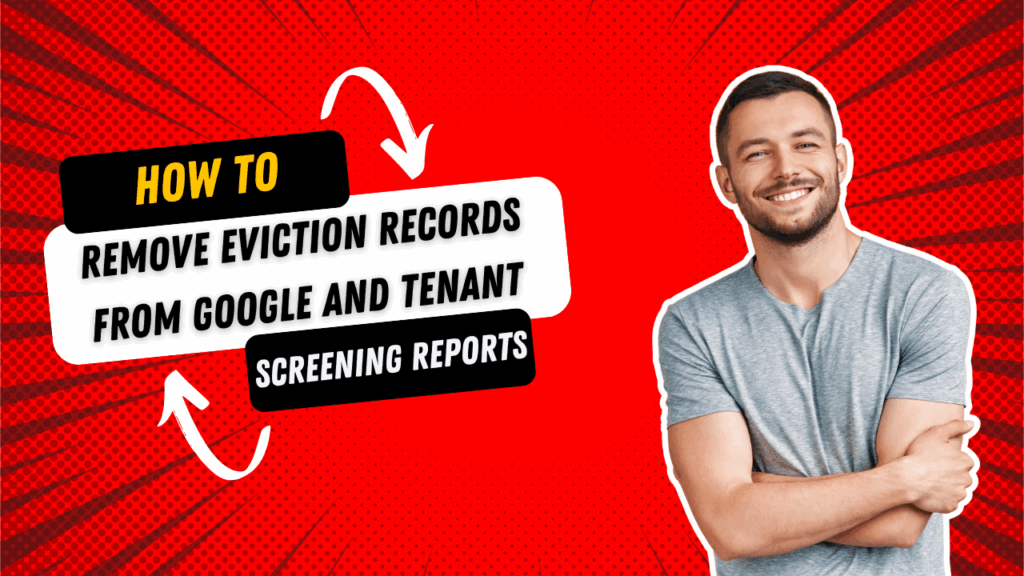An eviction on your record can make life harder than it should be. It can block housing applications, hurt your reputation, and even pop up in search results. The good news? You’re not stuck with it forever.
Let’s walk through how to clean up eviction records from Google and tenant screening reports.
Dig Deeper: How to Remove Court Records from Google Search
Why Eviction Records Show Up Online
Court Records Are Public
When a landlord files for eviction, it becomes a public court record. Anyone can access it. That includes Google, background check companies, and third-party websites that scrape court databases.
Even if you won or the case was dismissed, the record might still exist. Most people don’t realize this until they search their name or apply for a new apartment.
Tenant Screening Companies Keep Copies
Tenant screening services like CoreLogic, RentPrep, and RealPage gather court data. They often keep older eviction records, even if they’re outdated or resolved. If they aren’t notified of an update or dismissal, your report may still show the eviction.
Google Indexes Everything
Once your name appears on a court docket or a data broker site, Google picks it up. It stays in search results unless you remove it from the source or bury it with better content.
Step 1: Dispute Inaccurate or Outdated Records
Check the Accuracy
If the eviction never happened, was dismissed, or you won the case, you can dispute it. Start by reviewing your tenant report with:
- CoreLogic SafeRent
- TransUnion SmartMove
- Experian RentBureau
Under the Fair Credit Reporting Act (FCRA), these companies must investigate and correct wrong information.
How to Dispute
Request a copy of your tenant screening report. You’re entitled to one free report per year. If you find errors:
- File a dispute with the company
- Include court documents showing dismissal or a favorable judgment
- Wait up to 30 days for a response
If they don’t fix it, submit a complaint to the Consumer Financial Protection Bureau (CFPB).
Step 2: Expunge or Seal the Court Record
Ask the Court
In some states, you can request that your eviction be expunged or sealed. This removes it from public view.
You may qualify if:
- The case was dismissed
- You won the eviction trial
- It’s been several years since the judgment
State Rules Vary
For example, in California, tenants can request sealing under AB 2819. In Illinois, courts may expunge cases where tenants weren’t at fault. Other states may offer relief after a certain time has passed.
Check with a local attorney or legal aid office. Court websites sometimes provide forms for expungement.
Step 3: Remove It from Google Search Results
Ask the Site to Delete It
If the eviction is gone from the court’s site but still shows up in search, find out where it lives. It could be a site like:
- MyLife
- CourtCaseFinder
- TenantAlert
Contact the site. Ask them to take down or update the page. Show proof that the case was dismissed or sealed.
Use Google’s Removal Tools
If your eviction appears with personal info like your address or full name, you can submit a removal request to Google. They may remove results that include:
- Home address
- Government ID numbers
- Medical or financial info
This only removes the link from Google. The content stays on the site unless they take it down.
Suppress with Positive SEO
If removal isn’t possible, bury the result. Create new pages with your name:
- Personal website or blog
- LinkedIn and social media
- Guest posts or press releases
Over time, these pages can rank higher than the eviction listing. This is where a reputation management service comes in handy. One company, Top Shelf Reputation, helps individuals suppress unwanted results using positive content and SEO.
Step 4: Prevent Future Issues
Monitor Your Records
Use tools like:
- AnnualCreditReport.com
- Reputation monitoring services
- Tenant screening review tools
Set up alerts for your name so you catch issues early.
Stay in Contact with Past Landlords
If you resolved a dispute or came to an agreement, ask them for a written statement. It can help clear things up in future applications.
Be Honest with New Landlords
If a record does show up, explain the situation upfront. Many landlords care more about how you communicate than what’s on paper.
Eviction Records by the Numbers
According to the Eviction Lab at Princeton University:
- Nearly 3.6 million eviction cases are filed annually in the U.S.
- Only a small percentage are expunged or sealed
- Many dismissed cases still appear in tenant screenings
A 2021 study found that over 22% of tenant reports contained at least one error. That’s a lot of misinformation affecting people’s housing.
Final Thoughts
Removing an eviction record from Google and tenant reports isn’t easy, but it’s possible. Start by checking for errors. If the case was resolved in your favor, dispute it and push for removal. If not, you can still reduce the damage by suppressing it and managing your reputation.
Keep your records clean, monitor your name, and stay proactive.
Because no one should be defined by one bad moment on a court docket.
Need help? Top Shelf Reputation specializes in managing court records online, even when they can’t be fully removed. Contact us today to take back control of your online image.

